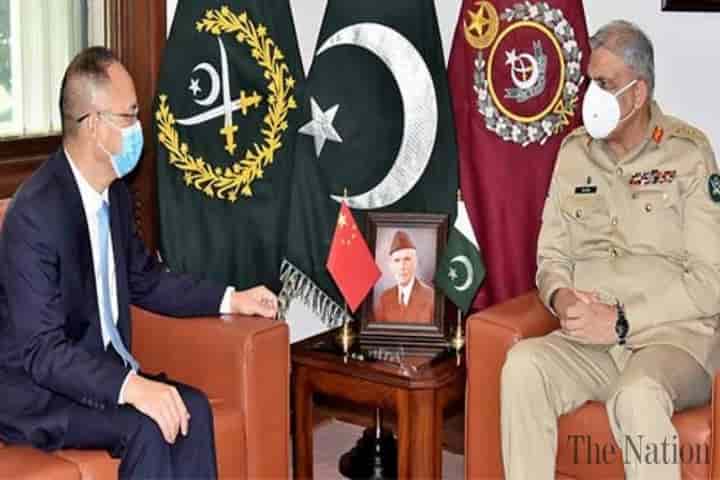Not satisfied with the progress in the investigation of the attack on Chinese engineers in Kohistan district on July 14, the Chinese ambassador to Pakistan met the country’s powerful army chief General Qamar Javed Bajwa on Monday.
The Chinese ambassador Nong Rong conveyed to Bajwa China’s concerns about the security of Chinese nationals working on the various projects under the China Pakistan Economic Corridor (CPEC) as reported by the Pakistani daily Dawn. CPEC is the flagship of China’s Belt and Road Initiative (BRI)—a prestige connectivity undertaking marshalled by Chinese President, Xi Jinping.
Gen. Bajwa, assuring full cooperation and security of Chinese citizens working in Pakistan told the Chinese envoy that “investigations” are underway, and culprits will be nabbed very soon.
He also underlined that “Pakistan Army greatly values its brotherly relations” with its time-tested friend, China,” according to a press release issued by Pakistan’s Inter-Services Public Relations (ISPR) department. “The army chief told the ambassador that both countries need to thwart the designs of those threatening their strategic cooperation”.
Last Wednesday, a bus carrying Chinese personnel was hit by a blast in the Upper Kohistan district of Pakistan's northwest Khyber Pakhtunkhwa province, killing nine Chinese nationals and three Pakistanis. The Dasu project is part of CPEC. China is concerned about the safety of thousands of its workers who are working in different projects of CPEC.
Unlike the previous attacks, this time, no group has claimed responsibility for the attack.
Not satisfied with the initial response by the Pakistani authorities about the “nature” of the attack, China rushed its 15 investigators to probe the incident. It also cautioned and issued an advisory to its citizens working in Pakistan to “stay on alert, pay close attention to the local security situation, strengthen security protection, take strict precautions, and stop going out unless necessary”.
On Monday, China’s foreign ministry Spokesperson Zhao Lijian told reporters that China is highly concerned about the incident. “We believe that China and Pakistan will find out the truth and bring the perpetrators to justice. The Chinese Embassy in Pakistan and the cross-departmental joint working group in Pakistan are working with the Pakistani side to properly handle the matter concerning the bodies of the nine victims.”
Pakistani Interior Minister Sheikh Rashid told the media on Saturday that investigations were at an advanced stage and the culprits would be taken to task soon.
According to the Pakistani experts, while Pakistani agencies including the army, ISI, police, and counter terrorism department are involved in the probe, they do not have any information yet about the investigation that is being carried out by the Chinese.
The incident has underlined the security risks of operating in Pakistan, where the Pakistan Taliban, Tehreek-e-Taliban Pakistan (TTP), has re-emerged strongly, in tune with the US withdrawal of troops from Afghanistan.
In April, the TTP said it launched a suicide attack on a luxury hotel in Quetta, the capital of Balochistan province in Pakistan, which was hosting the Chinese ambassador. At that time, the Pakistani army had told China that it had raised a whole division size force to protect the project, and they were planning to deploy another division for this purpose.
Earlier reports said a Special Security Division (SSD) comprising 9,000 Pakistan Army soldiers and 6,000 para-military forces personnel has been set up for the security of the CPEC projects and Chinese nationals working on them.
China has no military presence in Pakistan and has repeatedly asked Pakistani army to provide a large security cover to protect the $62bn CPEC.




















